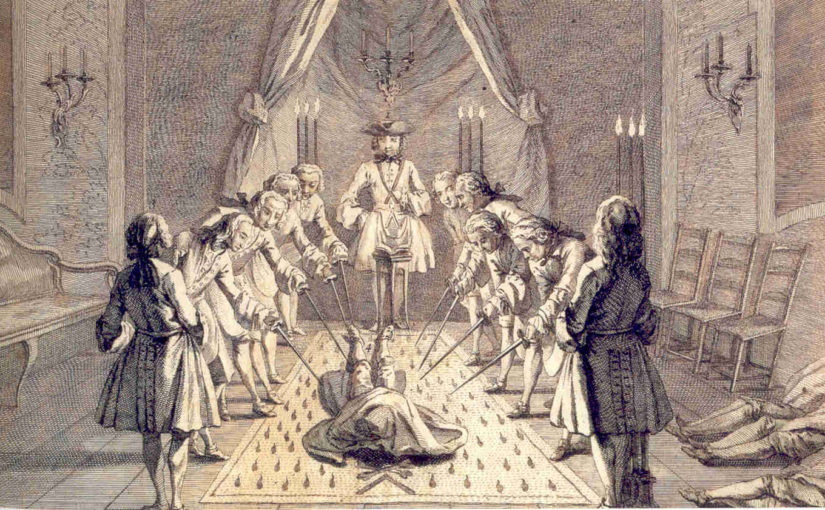In an article that Freemasonry.com published last month , a Brother from the United States of America writes about the issue of diminishing masonic membership in his Country. Why should we in England be concerned ? Because unless measures are taken that go beyond a soft recruitment campaign , even Freemasonry on this side of the Atlantic Ocean will experience a similar crisis.
It is not that Freemasonry isn’t pure in its aims, its values and beliefs ; just that those assemblies of good men who meet on the square , resemble more and more social clubs rather than Masonic lodges.
Recently – says Bro. Milliken – Freemasons are dismayed at all the talks of membership, lodge dues, dress, Grand edicts and other issues that they believe bring (…) undue debates and divisions in the Craft.
For them the symbolism, the virtues, morality and the positive effect that all of these things have on our soul, are the only things that should be talked about within the Masonic community.
They are the Philosophical or Intellectual Masons.
Who cares where we meet, they say, or what we look like and how many of us are present at our meetings (…). They see Freemasonry as a philosophy that can exists regardless of its structure because a philosophy requires no administration or infrastructure. It requires thought, enlightenment and personal practice without incumbencies. It does not need a building or a leader or any authority imposed on it. Freemasonry is indestructible; it is a personal journey (…) that only requires a personal commitment to its ideals and life changing message.
On the other side of the divide we have the Structural & Administrative Freemasons, who tell us that (…) a Society, a Brotherhood without structure is anarchy. Indeed it ceases to be a Brotherhood because what is lost is the interpersonal relationship, the personal contact, the camaderie.
(…) But if you are going to have infrastructure like a temple, a ritual, a dogma, a catechism, a leadership, then – say those Masons – you are going to have rules and enforcement. Membership dues, budgets, dress, qualifications, etc. thus become justifiable issues.
Brother Milliken adds that in America the lodges have stopped teaching what Freemasonry has to offer and instead only pay lip service to its philosophy ; whereas the Lodges in Europe, he writes, are of the Philosophical kind. I think he is not well informed and that the old proverb “the grass is always greener on the other side of the fence” never went out of date!
In my experience even in England the Masonic lodges spend a considerable part of their time in funds raising, social gatherings, community actions, charity work, brandy&cigar or curry dinner nights! And that is exactly what is leading them to diminishing numbers, for not everything appeals to everyone, from the entered apprentice to the worshipful master. The Freemasons might as well change their name and call themselves Distinctive Gentlemen, get on with the afore mentioned activities and abandon the pretension of aiming to make a good man into a better person through the teaching of the Craft’s ancient customs and secret art.
Masons have something great to offer, yet they practice mundane things, the sort that any person could get in any number of other organizations. They are also given directives to behave like happy chummies, to always smile, to abstain or be light in their comments , to be helpful and look interested in all the people they meet. Indeed , should you surf the web and visit sites like Twitter, Facebook or Whatsup you will read many messages left by Freemasons that remind you of public school students exchanges. They joke, they banter, they write about subjects of absolutely no importance and relevance to Freemasonry of the “philosophical kind”. Many Freemasons also parrot the ritual, they teach Entered Apprentices nothing about our secrets , always congratulate themselves for the very little they do, praise the E.A.F.s for their conduct – which they never really put to the test – and let them progress through the lodge offices whether they deserve it or not.
What is then the way forward?
There is a solution to the problem, says Brother Milliken, but it requires the Administrator Freemasons to put back into their lodge a program of healthy study and education in Esoteric Masonry. This must be the emphasis of the lodge for this is what distinguishes Freemasonry from every other organization out there that makes charity; like the Rotary Club, the Lyons Club, the Oddsfellow Society for example.
During the last few years the Provinces of the UGL have run a campaign of recruitment by allowing Masonic lodges to advertise themselves and have a presence on the web. But however successful such campaign of recruitment may continue to be, the biggest problem that Freemasonry will continue to have is not membership in numbers but in the retention and quality of the recruits.
Initiates – often attracted to Freemasonry by curiosity or the false belief that their status in society will be enhanced by becoming a Freemason – join our Order and soon after they find that we are not serious about our philosophy. The earnest Freemasons among them will then take two courses of action to demonstrate their disappointment : a) they will either resign b)they will become absent Freemasons thus throwing their lodges back onto the path of an uncertain future.
In conclusion it is of paramount importance that only if the Freemasons attack head-on this retention and recruits quality issue, we will see a 21st century growing and thriving Fraternity of good men.
Aldo Reno
- His Majesty’s Servant , David Garrick Esq – Freemason ? - June 7, 2024
- Influencia de la Masonería en Chile - April 29, 2024
- Pomegranate in Freemasonry – its significance - March 11, 2024

